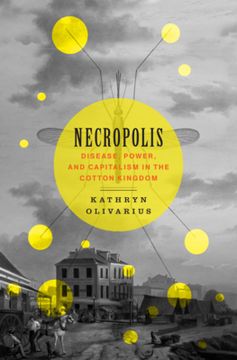Compartir
Necropolis: Disease, Power, and Capitalism in the Cotton Kingdom (en Inglés)
Kathryn Olivarius
(Autor)
·
Belknap Press
· Tapa Dura
Necropolis: Disease, Power, and Capitalism in the Cotton Kingdom (en Inglés) - Olivarius, Kathryn
$ 27.14
$ 36.00
Ahorras: $ 8.86
Elige la lista en la que quieres agregar tu producto o crea una nueva lista
✓ Producto agregado correctamente a la lista de deseos.
Ir a Mis ListasSe enviará desde nuestra bodega entre el
Viernes 17 de Mayo y el
Lunes 20 de Mayo.
Lo recibirás en cualquier lugar de Estados Unidos entre 1 y 3 días hábiles luego del envío.
Reseña del libro "Necropolis: Disease, Power, and Capitalism in the Cotton Kingdom (en Inglés)"
Disease is thought to be a great leveler of humanity, but in antebellum New Orleans acquiring immunity from the scourge of yellow fever magnified the brutal inequities of slave-powered capitalism. Antebellum New Orleans sat at the heart of America's slave and cotton kingdoms. It was also where yellow fever epidemics killed as many as 150,000 people during the nineteenth century. With little understanding of mosquito-borne viruses--and meager public health infrastructure--a person's only protection against the scourge was to "get acclimated" by surviving the disease. About half of those who contracted yellow fever died. Repeated epidemics bolstered New Orleans's strict racial hierarchy by introducing another hierarchy, what Kathryn Olivarius terms "immunocapital." As this highly original analysis shows, white survivors could leverage their immunity as evidence that they had paid their biological dues and could then pursue economic and political advancement. For enslaved Blacks, the story was different. Immunity protected them from yellow fever, but as embodied capital, they saw the social and monetary value of their acclimation accrue to their white owners. Whereas immunity conferred opportunity and privilege on whites, it relegated enslaved people to the most grueling labor. The question of good health--who has it, who doesn't, and why--is always in part political. Necropolis shows how powerful nineteenth-century white Orleanians--all allegedly immune--pushed this politics to the extreme. They constructed a society that capitalized mortal risk and equated perceived immunity with creditworthiness and reliability. Instead of trying to curb yellow fever through sanitation or quarantines, immune white Orleanians took advantage of the chaos disease caused. Immunological discrimination therefore became one more form of bias in a society premised on inequality, one more channel by which capital disciplined and divided the population.
- 0% (0)
- 0% (0)
- 0% (0)
- 0% (0)
- 0% (0)
Todos los libros de nuestro catálogo son Originales.
El libro está escrito en Inglés.
La encuadernación de esta edición es Tapa Dura.
✓ Producto agregado correctamente al carro, Ir a Pagar.

